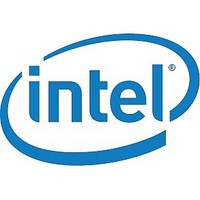NQ5000P S L9TN Intel, NQ5000P S L9TN Datasheet - Page 371

NQ5000P S L9TN
Manufacturer Part Number
NQ5000P S L9TN
Description
Manufacturer
Intel
Datasheet
1.NQ5000P_S_L9TN.pdf
(530 pages)
Specifications of NQ5000P S L9TN
Mounting
Surface Mount
Lead Free Status / RoHS Status
Not Compliant
- Current page: 371 of 530
- Download datasheet (5Mb)
Functional Description
5.15.5
5.15.5.1
5.15.5.2
Figure 5-42. Random Byte Read Timing
Intel® 5000P/5000V/5000Z Chipset Memory Controller Hub (MCH) Datasheet
FB-DIMM SPD Interface, SM Buses 1, 2, 3 and 4
The MCH integrates a 100 KHz SPD controller to access the FB-DIMM configuration
information. SMBus 1 is dedicated to FB-DIMM branch 0, channel 0 DIMMs. SMBus 2 is
dedicated to FB-DIMM branch 0, channel 1 DIMMs. SMBus 3 is dedicated to FB-DIMM
branch 1, channel 0 DIMMs and SMBus 4 is dedicated to FB-DIMM branch 1, channel 1
DIMMs. There can be a maximum of four SPD EEPROM’s associated with each SPD bus.
The FB-DIMM SPD interfaces are wired as depicted in
Board layout must map chip selects to SPD Slave Addresses as shown in
slave address is written to the SPDCMD configuration register.
SPD Asynchronous Handshake
The SPD bus is an asynchronous serial interface. Once software issues an SPD
command (SPDCMD.CMD = SPDW or SPDR), software is responsible for verifying
command completion before another SPD command can be issued. Software can
determine the status of an SPD command by observing the SPD configuration register.
An SPD command has completed when any one command completion field (RDO, WOD,
SBE) of the SPD configuration register is observed set to 1. An SPDR command has
successfully completed when the RDO field is observed set to 1. An SPDW command
has successfully completed when the WOD field is observed set to 1. An unsuccessful
command termination is observed when the SBE field is set to 1. The MCH will clear the
SPD configuration register command completion fields automatically whenever an
SPDR or SPDW command is initiated. Polling may begin immediately after initiating an
SPD command.
Software can determine when an SPD command is being performed by observing the
BUSY field of the SPD configuration register. When this configuration bit is observed set
to 1, the interface is executing a command.
Valid SPD data is stored in the DATA field of the SPD configuration register upon
successful completion of the SPDR command (indicated by 1 in the RDO field). Data to
be written by an SPDW command is placed in the DATA field of the SPDCMD
configuration register.
Unsuccessful command termination will occur when an EEPROM does not acknowledge
a packet at any of the required ACK points, resulting in the SBE field being set to 1.
Request Packet for SPD Random Read
Upon receiving the SPDR command, the MCH generates the Random Read Register
command sequence as shown in
MCH SPD configuration register in bits [7:0], and the RDO field is set to 1 by the MCH
to indicate that the data is present and that the command has completed without error.
S
T
A
R
T
D
T
3
I
Slave Address
D
T
2
I
D
T
1
I
D
T
0
I
S
A
2
S
A
1
S
A
0
W
R
/
A
C
K
0
B
A
7
B
A
6
Byte Address
A
B
5
B
A
4
B
A
3
Figure
B
A
2
B
A
1
B
A
0
5-42. The returned data is then stored in the
A
C
K
S
A
R
T
T
D
T
3
I
Slave Address
D
T
2
I
D
T
1
I
D
T
0
I
S
A
2
Figure
S
A
1
S
A
0
W
R
/
A
C
K
5-7.
1
DATA
Table
5-7. The
N
A
C
K
S
T
O
P
371
Related parts for NQ5000P S L9TN
Image
Part Number
Description
Manufacturer
Datasheet
Request
R

Part Number:
Description:
5000P Memory Controller Hub (MCH)
Manufacturer:
Intel Corporation
Datasheet:

Part Number:
Description:
Microprocessor: Intel Celeron M Processor 320 and Ultra Low Voltage Intel Celeron M Processor at 600MHz
Manufacturer:
Intel Corporation

Part Number:
Description:
Intel 82550 Fast Ethernet Multifunction PCI/CardBus Controller
Manufacturer:
Intel Corporation
Datasheet:

Part Number:
Description:
Intel StrataFlash memory 32 Mbit. Access speed 120 ns
Manufacturer:
Intel Corporation
Datasheet:

Part Number:
Description:
Intel StrataFlash memory 32 Mbit. Access speed 120 ns
Manufacturer:
Intel Corporation
Datasheet:

Part Number:
Description:
Intel StrataFlash memory 64 Mbit. Access speed 150 ns
Manufacturer:
Intel Corporation
Datasheet:

Part Number:
Description:
Intel StrataFlash memory 32 Mbit. Access speed 100 ns
Manufacturer:
Intel Corporation
Datasheet:

Part Number:
Description:
DA28F640J5A-1505 Volt Intel StrataFlash Memory
Manufacturer:
Intel Corporation
Datasheet:

Part Number:
Description:
5 Volt Intel StrataFlash?? Memory
Manufacturer:
Intel Corporation
Datasheet:

Part Number:
Description:
5 Volt Intel StrataFlash?? Memory
Manufacturer:
Intel Corporation

Part Number:
Description:
Intel 6300ESB I/O Controller Hub
Manufacturer:
Intel Corporation
Datasheet:

Part Number:
Description:
Intel 82801DB I/O Controller Hub (ICH4), Pb-Free SLI
Manufacturer:
Intel Corporation
Datasheet:

Part Number:
Description:
Intel 82801FB I/O Controller Hub (ICH6)
Manufacturer:
Intel Corporation
Datasheet:










